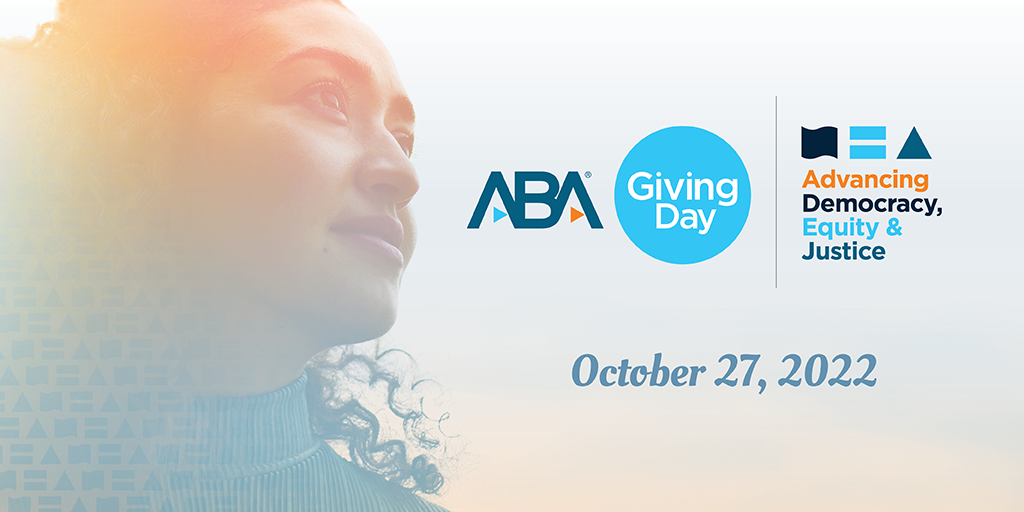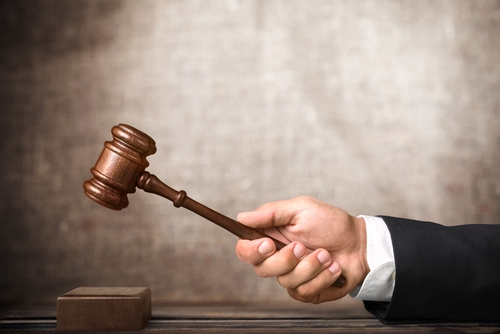During ABA Giving Day, members can support efforts advocating for democracy, equity and justice
Pro Bono
During ABA Giving Day, members can support efforts advocating for democracy, equity and justice
October 18, 2022, 11:10 am CDT
Amid the COVID-19 pandemic, the ABA’s members, volunteers and donors have answered the call to help increase legal services and transform the justice system.
The Fund for Justice and Education, the ABA’s charitable arm, hopes to build on that momentum during this year’s ABA Giving Day. Its goal for the Oct. 27 initiative—which has the theme Advancing Democracy, Equity & Justice—is to raise $300,000 for programs that promote civic education and voting rights, advocate for environmental and social justice, improve access to justice and uphold the rule of law.
In 2020, the inaugural ABA Giving Day attracted more than 300 donors who contributed $115,000 to eight programs addressing the impact of the pandemic and advancing racial justice. The 2021 ABA Giving Day featured 16 programs that support the people and programs that strengthen communities. By the end of the campaign, more than 730 people donated more than $252,000.
In addition to its goal to far exceed last year’s fundraising total, the FJE aims to inspire more than 1,000 donors to support causes that are important to them.
“Contributions from ABA members and the public help uphold the rights of the most vulnerable, protect the rule of law and ensure a more inclusive justice system now and in the future,” ABA President Deborah Enix-Ross said in a news release. “Most importantly, donations empower attorneys, local civic leaders and community members to be bold, purposeful advocates for justice.”
ABA Giving Day will be held in conjunction with the National Celebration of Pro Bono, which runs from Oct. 23-29. The campaign began accepting donations on Oct. 13, and has already raised more than $47,000.
This year, donors can contribute to the Fund for Justice and Education Annual Fund as well as to 16 entities and programs that advance democracy, equity or justice:
• The Commission on Immigration, which supports fair treatment and due process rights for immigrants, asylum-seekers and asylees through the Children’s Immigration Law Academy, Immigration Justice Project and South Texas Pro Bono Asylum Representation Project.
• The Rule of Law Initiative’s Afghanistan Response Project, which helps Afghan refugees living in Emirates Humanitarian City and other temporary camps resettle into permanent homes.
• The Section of State and Local Government Law’s Defending Democracy initiative, which aims to educate the public about the important role of election workers.
• The Section of Civil Rights and Social Justice’s Voting Rights & Election Protection Project, which empowers attorneys to advocate for voters’ access to the ballot and nonpartisan redistricting.
• The Division of Public Education Cornerstones of Democracy program, which promotes restoring confidence in the nation’s institutions and understanding the rule of law through civics, civility and collaboration.
• The Commission on Sexual Orientation and Gender Identity, which seeks to secure equal treatment of lesbian, gay, bisexual and transgender individuals in the legal profession and justice system.
• The Commission on Women in the Profession, which works to identify and remove systemic barriers that hinder the success of female lawyers.
• The Judicial Division and Council for Diversity in the Educational Pipeline’s Judicial Clerkship Program, which gives law students of color the opportunity to participate in research and brief-writing, observe oral arguments and network with judges.
• The Legal Opportunity Scholarship Fund, which encourages racial and ethnic minority students to apply to law school and provides them with three-year scholarships.
• The Litigation Section’s Judicial Intern Opportunity Program, which works to increase diversity in the courts by helping underrepresented law students obtain paid judicial internships.
• The Commission on Law and Aging, which aims to secure and strengthen the legal rights, dignity, autonomy and quality of care of older adults.
• The Commission on Homelessness and Poverty, which helps develop legal solutions that remove barriers to housing, employment, treatment and education for individuals experiencing homelessness.
• The Criminal Justice Section’s Legal Education Police Practices Consortium, which combines the expertise of the ABA and 60 law schools to develop and implement better police practices throughout the United States.
• The Section of Environment, Energy and Resources, which advances environmental justice and addresses the disproportionate effects of policies and practices on communities of color, indigenous communities, low-income communities and other vulnerable populations.
• The Section of Taxation’s Tax Assistance Public Service Endowment Fund, which provides funding to tax-related public service programs for underserved taxpayers.
• The Standing Committee on Pro Bono and Public Service’s Free Legal Answers, which connects low-income individuals and families to free online legal advice from pro bono lawyers.
For more information or to donate, visit the ABA Giving Day website.






